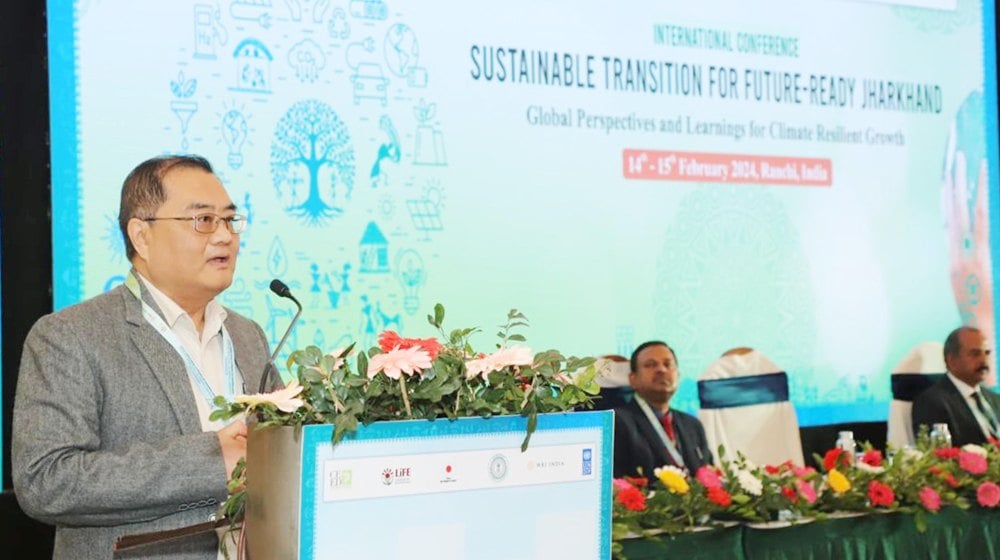Ranchi: On the first day of the International Conference ‘Sustainable Just Transition for Future Ready Jharkhand’, during the discussion on the global perspective and best practices related to Just Transition, its relevance for implementation in Jharkhand was emphasized.
The two-day event was organized by the Task Force-Sustainable Just Transition, Government of Jharkhand, in collaboration with Centre for Environment and Energy Development (CEED), United Nations Development Program (UNDP-India) and World Resources Institute, India.
The official website of the task force was also launched during the conference.
The event was attended by the Chief Secretary and Additional Chief Secretary of the Government of Jharkhand, including senior officers of various departments and agencies of the Central and State Governments – especially Uttar Pradesh, Karnataka, Maharashtra, Bihar, West Bengal, Chhattisgarh, Odisha, Jammu and Kashmir and Jharkhand. There was a dignified presence of the officers.
At the conference, renowned organizations, industry leaders, energy and sustainability experts, and civil society from thirty countries of the world including Japan, America, Germany, South Africa, South Korea, and Indonesia presented their experiences and views on policy initiatives and steps related to transition.
L. Khiangte, IAS, Chief Secretary, Government of Jharkhand, said that the State Government is committed to ensure that no one is left behind in this process of sustainable transition, hence it has been made inclusive and participatory.
In this sequence, today is a special day to discuss the best practices of the world to give direction to better policy-making in the state.
Convergence approach and comprehensive vision is very important in national and state level efforts for better results towards carbon-neutral and climate-friendly economy.
Explaining the context and objective of the conference A.K. Rastogi, IFS, Chairman, and Task Force-Sustainable Just Transition said that this is the first of its kind global perspective program in India, which provides a detailed outline of successful strategies and effective programs for Just Transition.
He further said that this initiative will contribute significantly in identifying the future steps of Jharkhand, which will help in harmonizing the roadmap related to priority areas like energy transition, decarbonisation, livelihood, green hydrogen, investment and finance etc.
Manoj Singh, IAS, Additional Chief Secretary, Department of Environment, Forest and Climate Change, Government of Uttar Pradesh, said that Jharkhand has become a leading state in taking far-reaching steps in the context of Just Transition.
Conference is an important link in this broader initiative.
Low carbon innovations and effective strategies suited to Jharkhand’s environment should be adopted.
Addressing the conference, Isabelle Tschan, Resident Representative of the United Nations Development Program (UNDP-India) emphasized on sharing knowledge to promote clean energy based infrastructure, investment and alternative livelihoods.
He said that community interest and gender equality should be on top of the priority list to make Just Transition more inclusive in Jharkhand.
CEED CEO Ramapati Kumar said that this conference is very important in connecting Jharkhand’s efforts with global initiatives related to sustainable transition.
In the light of global experiences, models of energy security and climate resilience should be prepared at the regional and local level, for this a favourable policy environment, creation of financial system and sectoral convergence are necessary.
The two-day conference featured a variety of technical and breakout sessions to dialogue on multi-faceted aspects of a just transition, ranging from energy transition, creation of green jobs and economic diversification, decarbonized future, role of local communities in creating alternative livelihoods, green Focused on building a hydrogen ecosystem, expanding the scope of climate finance and enhancing capacity building of diverse stakeholders.
The expected outcomes of the conference include sharing knowledge of transition experiences of the Global South and North, Discussing the socio-economic benefits of low-carbon strategies, to promote partnership among stakeholders, and to formulate a policy framework for the implementation of transition-related strategies.
Senior officials of the state government departments of Forest, Environment and Climate Change, Agriculture presented their views at the event.
The conference was attended by representatives of UNDP India, WRI India, World Bank, Asian Development Bank, International labour Organization, Coal India Limited, Central Coalfields Limited, Steel Authority India Limited, National Thermal Power Corporation, and Indian Institute of Forest Management.

